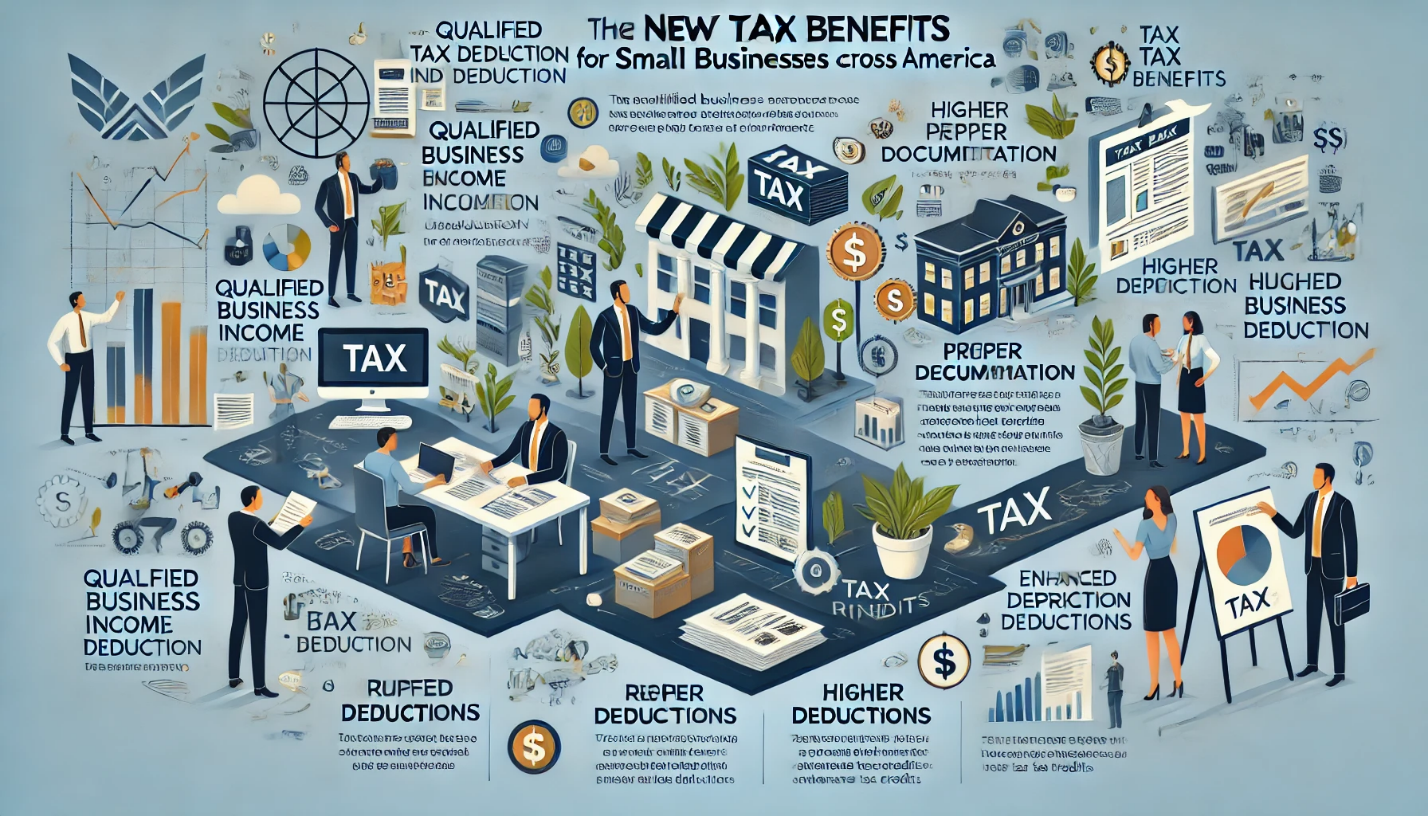New Tax Benefits for Small Businesses in America: Maximizing Savings

Look for all the new tax benefits for small businesses across America and maximize your savings with the newest tax incentives.
Mastering the intricacies of small business taxes can be overwhelming alone, more so with changing legislation. Recent changes, however, have brought new tax benefits for small businesses in America that can increase your bottom line significantly. These tax incentives, if rightly understood and applied, will help you maximize your savings and put them into reinvestment for business growth.

New Tax Benefits for Small Businesses in America Maximizing Savings
Understanding Small Business Taxes
Small business taxes include federal, state, and local income, self-employment, employment, and sales taxes. Each of these has its own rules and regulations in place that change from time to time based on the type of business structure. Keeping oneself current means one is compliant and able to take advantage of the tax benefits available.
New Tax Benefits: Overview
Qualified Business Income Deduction (QBI)
Probably, the QBI deduction is one of the most meaningful tax reforms affecting small businesses from the Tax Cuts and Jobs Act. The code allows eligible businesses to deduct up to 20% off their qualified business income, which tends to significantly reduce taxable income.
Higher Depreciation Deductions
Recent changes have enhanced depreciation deductions, allowing businesses to write off the cost of certain property more quickly than had formerly been permitted. Consequently, the Section 179 deduction and bonus depreciation are extremely valuable since they permit the immediate expense of qualified property rather than depreciating over a number of years.
Enhanced Tax Credits
Several tax credits have been enhanced to become much more generous. Huge potential savings are open to businesses through the Work Opportunity Tax Credit and the Research and Development Tax Credit if they either hire from targeted groups or invest in innovation.
You May Also Like:
Starting the Business Succession Journey: A Guide for Entrepreneurs
Tax Credits for Employers
Tax credits for employers increase to encourage small business owners to provide benefits such as health insurance and a retirement plan. Small Business Health Care Tax Credit and Retirement Plans Startup Costs Tax Credit may be used to defray the cost of providing these benefits.
How to Maximize Savings with Tax Incentives
Proper Documentation and Record-Keeping
It’s essential to have accurate and detailed records for tax benefit claims. Proper documentation will help you support your claims in case your return is audited. In addition, it helps you compute deductions and credits accurately.
Staying Informed About Tax Law Changes
These tax laws are changing constantly, and so keeping yourself abreast of the latest developments is very important for maximizing your savings. Always consult a tax professional or use updated tax software to ensure compliance and optimize your tax strategy.
Professional Tax Consulting
Hiring a tax professional specializing in small business taxes can pay for itself by offering you individualized advice, helping you discover deductions and credits for which you are eligible, and ensuring that you are gaining the full range of tax benefits available for your situation.
Employing Tax Planning Strategies
Aggressive tax planning means planning for the future, for the upcoming tax years, by engaging in ways to minimize your tax liability. This would include timing your income and expenses, deferring income, or accelerating your deductions.
Impact of Recent Tax Reforms
Recent tax reforms have focused on both relief and incentives for small businesses. Comprehension and taking advantage of these reforms can help the small businesses reduce their tax burden and boost cash flow to reinvest and expand.
Key Take-Aways for Small Business Owners
It is very important to understand all the new tax benefits in order to help small businesses in America maximize their savings and ensure their financial health. Through these deductions and credits, utilizing tax planning strategies can reduce the tax liability for small business owners to a great extent, and the money gets reinvested in the business.
Example Case Studies
Case Study 1: QBI Deduction Success
A sole proprietorship with annual income of $100,000 was able to successfully claim the QBI deduction, reducing taxable income by $20,000 and saving approximately $4,400 in taxes.
Case Study 2: More Favorable Depreciation
A small manufacturing business invested $50,000 in new equipment. It was able to depreciate the full amount as an expense in the year purchased by using the Section 179 deduction and saved the business a considerable amount of money in taxes.
Future Trends and Considerations
Possible Legislative Changes
Stay tuned for further possible legislative changes that may impact small business taxation. Reforms in the future can introduce new benefits or alter existing ones, and companies will need to adapt accordingly for their tax planning.
Digital Revolution and Tax Efficiency
Technology helps ease the stress associated with tax procedures and increases efficiency. Digital record-keeping and digital methods of preparing and filing taxes enable small firms to keep up-to-date and take advantage of all the benefits enabled by taxes.
Green Tax Incentives
Coupled with increasing public concern about the environment, more green tax incentives can be expected in the future. Any small business investing in energy-efficient equipment or sustainable practices can also be rewarded with additional tax credits and deductions.
These new tax benefits to small businesses in America bring huge potential in maximizing your savings and building growth. With the right information, proper documentation, and professional advice, you can put yourself at the front of your small business and help guide it through the maze of small business taxes, obtaining all possible incentives and savings. Compliance and proactive tax planning will assure optimization of your financial strategy and promise a secured future for your business.
